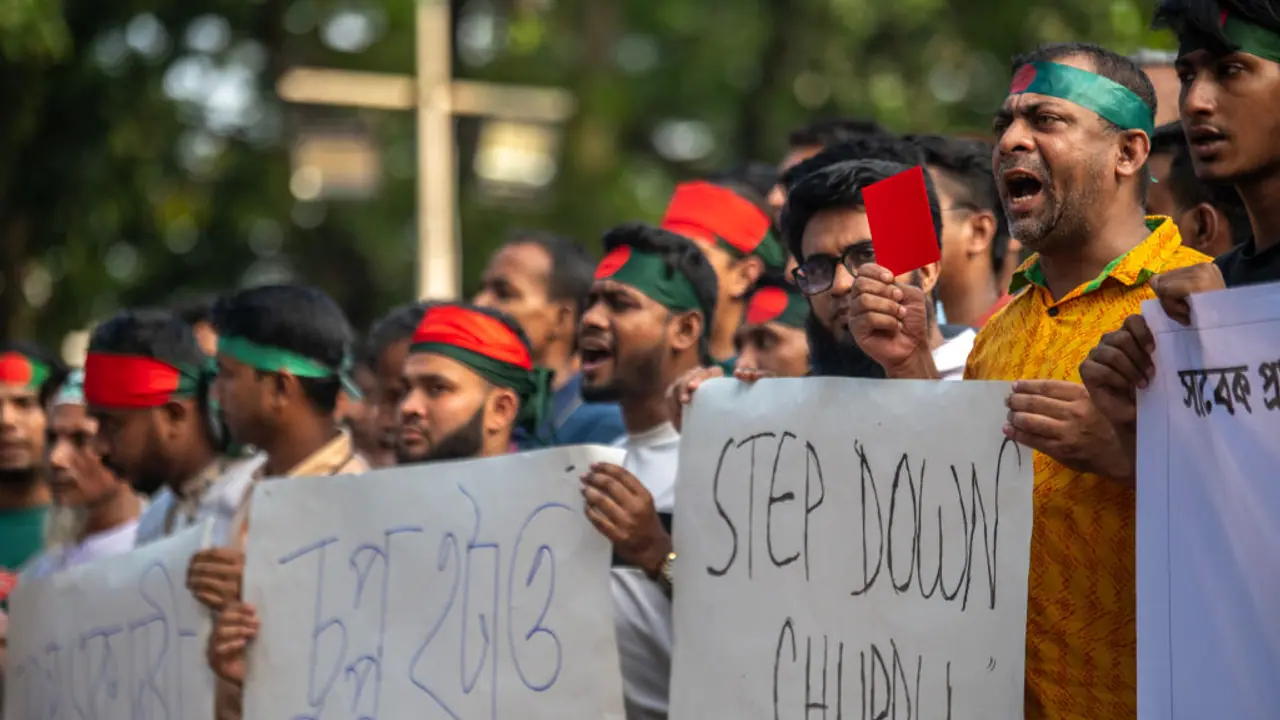Tensions escalated in Bangladesh on Tuesday as several hundred protesters attempted to storm the presidential palace, demanding the resignation of President Mohammed Shahabuddin.
Tensions escalated in Bangladesh on Tuesday as several hundred protesters attempted to storm the presidential palace, demanding the resignation of President Mohammed Shahabuddin. The unrest follows controversial remarks made by Shahabuddin regarding former Prime Minister Sheikh Hasina's resignation amidst a wave of student-led protests that culminated in her departure from the country on August 5.

In an interview with the Bangla daily Manab Zamin, Shahabuddin stated he lacked documentary evidence confirming Hasina's resignation before her flight, prompting outrage among protesters. Eyewitness accounts and media footage depicted clashes between demonstrators and police, who formed barricades to prevent access to Bangabhaban, the presidential residence.
In a bid to disperse the crowds, police deployed sound grenades, leading to intervention from military troops. The military subsequently used loudspeakers to appeal for calm and urged protesters to vacate the area.
According to hospital sources cited by The Business Standard, two individuals suffered gunshot wounds during the clashes, while a third was injured by a sound grenade. The Anti-Discrimination Student Movement, which played a pivotal role in the ousting of Hasina, rallied at the Central Shaheed Minar, reiterating demands for Shahabuddin's immediate resignation and the abolition of the 1972 Constitution.
7-day deadline for Shahabuddin’s removal
Hasnat Abdullah, a coordinator of the movement, outlined a five-point agenda, emphasizing the need to replace the current constitution to reflect the desires of the population in the wake of the recent upheaval.
“Our first point (of the five-point demand) is immediate scrapping of the 'pro-Mujb (Bangladesh’s founding leader) 1972 Constitution' which kept Chuppu (president’s nickname) in office," he said.
“The (1972) Constitution will have to be replaced by writing a new one against the backdrop of 2024 mass upheaval," Abdullah added.
He stated that the protesters would "return to the streets with full force" if the government did not meet their demands by the end of this week.
In response to the mounting pressure, Asif Nazrul, the law affairs adviser to the interim government led by Nobel laureate Muhammad Yunus, accused Shahabuddin of “falsehood” regarding his claims about Hasina’s resignation. Nazrul noted that Shahabuddin’s conflicting statements could call his credibility into question, suggesting potential grounds for his removal.
In a televised address on August 5 night, Shahabuddin had said, “You know Prime Minister Sheikh Hasina has tendered her resignation letter to the president and I have received it.”He made the remarks as army chief General Waker uz Zaman along with navy and air chiefs stood beside him.
Legal experts assert that Bangladesh's Parliament holds the authority to impeach the president, yet the current political climate may necessitate actions outside of traditional legal frameworks. Constitutional scholar Shahdhin Malik stated that the ongoing debates over the resignation letter are unnecessary, as the interim government was formed based on the Supreme Court’s guidance.
Bangladesh president urges people not to reignite controversy
The president’s office has urged citizens to refrain from reigniting disputes over what it termed a "settled issue."
“This is a clear statement from the president that answers regarding the resignation and departure of the former prime minister (Hasina) in the face of the students-people mass revolution, the dissolution of the Parliament, and all the questions raised in the public mind about the Constitutional validity of the incumbent Interim government are reflected in the order of the Appellate Division of the Supreme Court in Special Reference No-01/2024, dated August 8, 2024,” the statement said.
Nobel laureate Muhammad Yunus, 84, assumed the role of Chief Adviser to Bangladesh's interim government on August 8, following Prime Minister Hasina's departure to India on August 5.
